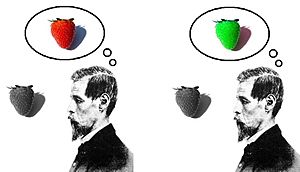Qualia facts for kids
Qualia (say "KWAL-ee-uh") is a special word philosophers use. It means the personal, private ways things feel or seem to us. Think of it as the raw, direct experience of something, like how a color looks or how a taste feels. It's part of a field of study called the philosophy of mind, which explores how our minds work.
For example, the sharp feeling of a headache, the unique taste of your favorite food, or the bright redness of a sunset are all examples of qualia. These are specific feelings or sensations that are different from just thinking about something or having a stream of thoughts.
A famous American philosopher named Daniel Dennett once said that qualia is "an unfamiliar term for something that could not be more familiar to each of us: the ways things seem to us." This means that even if the word sounds complicated, the idea behind it – how we personally experience the world – is something we all know very well.
Contents
What are Qualia?
Qualia are like the building blocks of our conscious experience. They are the individual, subjective parts of what we perceive. Imagine you're looking at a bright yellow lemon. The "yellowness" you see, the "sourness" you taste if you bite into it, and the "smoothness" you feel if you touch it are all examples of qualia. These are not just facts about the lemon; they are how the lemon appears to you.
Why are Qualia Important?
Philosophers study qualia because they help us understand how our minds work and how we experience the world. It's a big question: how does our brain, which is just a physical thing, create these rich, personal feelings and sensations? Qualia are key to this mystery. They make up the unique way each person experiences reality.
Examples of Qualia in Daily Life
Qualia are all around us, even if we don't use the word every day.
- Seeing Colors: The specific way the color blue looks to you. Is it the same as how it looks to someone else?
- Tasting Food: The distinct flavor of chocolate or the spiciness of a chili pepper.
- Feeling Pain: The sharp ache of a stubbed toe or the dull throb of a headache.
- Hearing Sounds: The unique sound of your favorite song or the loud noise of a fire alarm.
- Smelling Scents: The sweet smell of flowers or the strong smell of coffee.
Each of these is a private, personal experience that only you can truly know.
Philosophers and Qualia
Many philosophers have thought about qualia. They often debate if qualia are real and if they can be fully explained by science.
Daniel Dennett's View
Daniel Dennett, who we mentioned earlier, thinks that qualia are not as mysterious as some people believe. He argues that our experiences can be explained by how our brains process information. He believes that what we call "qualia" can be understood through studying the brain and how it works, rather than being something completely separate or magical.
Other Views on Qualia
Other philosophers, like David Chalmers, believe that qualia are a "hard problem" for science. They think that even if we understand everything about the brain, we still might not fully understand why we have these subjective experiences. They argue that there's something special about the feeling itself that can't just be reduced to brain activity. This debate is still ongoing and is a very active area of study in philosophy.
Images for kids
See also
 In Spanish: Qualia para niños
In Spanish: Qualia para niños
 | Percy Lavon Julian |
 | Katherine Johnson |
 | George Washington Carver |
 | Annie Easley |







